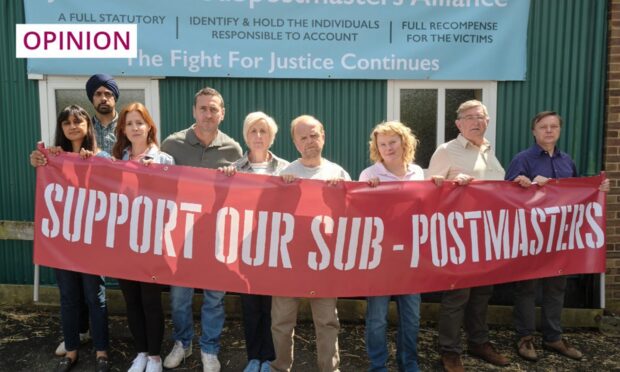I don’t think we’ve ever seen anything resembling the astonishing reaction to the television drama about the Post Office scandal.
A week after ITV screened Mr Bates vs The Post Office – the story of how a flawed software system screwed up branch accounts, leading to hundreds of subpostmasters being wrongly accused of false accounting and theft – we talk of little else.
Politicians scramble to be seen to help, while TV and radio schedulers fill the airwaves with latest developments. On Wednesday night, alone, there were three separate “specials” about the scandal on terrestrial telly.
Meanwhile, many of those affected – angry, articulate, and fully charged – may be seen and heard on rolling news channels. If you told me Alexander Armstrong and Richard Osman had recorded a Pointless “Jailed Postmasters” episode, I wouldn’t be at all surprised.
The facts of the Post Office scandal – that the Horizon software system created by Fujitsu was unfit for purpose, that hundreds of subpostmasters were accused of dishonesty, that many were convicted, that some killed themselves – have been known about for some time. But it took ITV’s brilliant drama, which told how former postmaster Alan Bates led a campaign that exposed the truth about the Post Office’s aggressive actions, despite senior management knowing about Horizon’s problems, to focus minds.
The strength of public reaction – real and justified outrage – sparked politicians into action. Demands for the compensation scheme to be made more efficient and for the wrongly convicted to have their records wiped clean have been answered with a promise from the government that ministers will attempt to pass legislation automatically quashing the conviction of anyone found guilty on the basis of Horizon-generated problems.
Scottish ruling needs more scrutiny
Surprisingly, Scottish politicians have been slow to speak out about this issue. For one thing, any of them could have won a chunk of easy news coverage by speaking up. For another, there are serious questions for both the Post Office and the Crown Office and Procurator Fiscal Service to answer.
South of the border, the Post Office has the authority to prosecute. In Scotland, however, subpostmasters were charged and tried on the say-so of the fiscal, on the basis of information supplied by the Post Office.
If we accept that the Post Office concealed what it knew about Horizon while running cases in England, can we be sure it was fully candid when reporting to Scottish prosecutors?
Scottish politicians have not only underestimated the strength of public feeling over the Post Office scandal; they’re missing the need to look more deeply into what happened. If key information held by the Post Office about the Horizon system was withheld from the fiscal, then there may be the need for a wider criminal investigation.
It’s splendid to see senior politicians trip over each other to be seen doing the right thing by subpostmasters, but it’s impossible to avoid the unpleasant truth that many of them didn’t give a hoot until Toby Jones popped up last week, in Bafta-winning form, on the box as Alan Bates.
What are the implications of changing the law?
The victims of what may be the worst miscarriage of justice in British history have been struggling for years to access meagre compensation. They may have won a class action against the Post Office, but their victory was followed by them being plunged into the nightmare of yet more bureaucratic intransigence.
On Wednesday, finally awake to the importance of the issue at hand, First Minister Humza Yousaf wrote to Rishi Sunak, calling for intergovernmental cooperation on plans to exonerate those convicted.
There is, I think, some risk that the current proposal may lead to further delays.
On the face of things, a law which would quash all convictions at once sounds pretty appealing. And so horrendous were the experiences of those wrongly dragged into court by the Post Office that we will gladly tolerate the truth that such a law would see some – a minority – guilty people being cleared and compensated. Better a few wrong ‘uns walk free than the former subpostmasters suffer a moment’s more delay than is absolutely necessary.
But what are the implications of changing the law to address this specific issue? If we believe in equality for justice for all, are we happy to see a two-tier system for miscarriages of justice determined on the basis of the popularity of a TV drama?
The final act in the story of the Post Office scandal is far from over.
Euan McColm is a regular columnist for various Scottish newspapers


Conversation